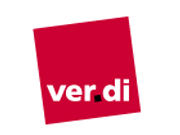News
UNI Finance supports ver.di Insurance workers strike

The conflict on the renewal of the collective agreement in the insurance sector, which employs about 175,000 people in Germany, has escalated. After three unsuccessful bargaining rounds, the Verdi services union announced, on June 17th, the beginning of a national strike between June 20th and June 22nd. Verdi blames the employers from trying to make wage negotiations contingent on the amendment of the framework collective agreement (Manteltarifvertrag), which is still in force. The union says that the changes employers want to make would severely worsen employees' working conditions.
The framework collective agreement at the heart of the conflict.. Strikes began on Monday in North Rhine-Westphalia, Hamburg, Berlin and the city of Leipzig and continued to other Länder onTuesday and Wednesday. Verdi is expecting between 7,000 and 8,000 strikers a day. The last bargaining round failed on May 31st. Verdi says that employers are the ones to blame for this escalation since they want wage negotiations to be contingent on changes to the framework collective agreement. Yet, these changes would translate into an intolerable worsening of employees’ working conditions. Verdi’s spokeswoman says that the employers’ federation of German insurance companies (AGV) is also calling for an extension of the duration of fixed-term contracts to four years as well as the extension of low-wage categories. They say the employers want to open up groups A and B, at the very bottom of the scale, to new categories of employees, who used to receive higher wages, such as kitchen or cleaning agents. Thus, after recruitment, they would earn less than their colleagues. These categories were created in 2007 to add some categories of workers (preparing postal sorting) to collective agreements. Verdi says employers also want to increase working time on Saturdays and remove holidays over the Christmas period. As long as employers haven’t withdrawn these terms,wecan’t negotiate pay” the spokesperson insisted.
Ver.di announced in November 2010 that it would call for a 6% wage increase or at least €150 a month, over 12 months. For their part, the employers offered a single €300 bonus in July and a wage increase divided in two: 2% in October 2011 and 1.5% in January 2013… over a duration of 33 months.
Source: Verdi officials and planet labour Planet Labor, June 20, 2011, No. 110415 – www.planetlabor.com

